Unit 3 Could you please tell me where the restrooms are? Section B 2a-2d课件(共24张PPT)
文档属性
| 名称 | Unit 3 Could you please tell me where the restrooms are? Section B 2a-2d课件(共24张PPT) | 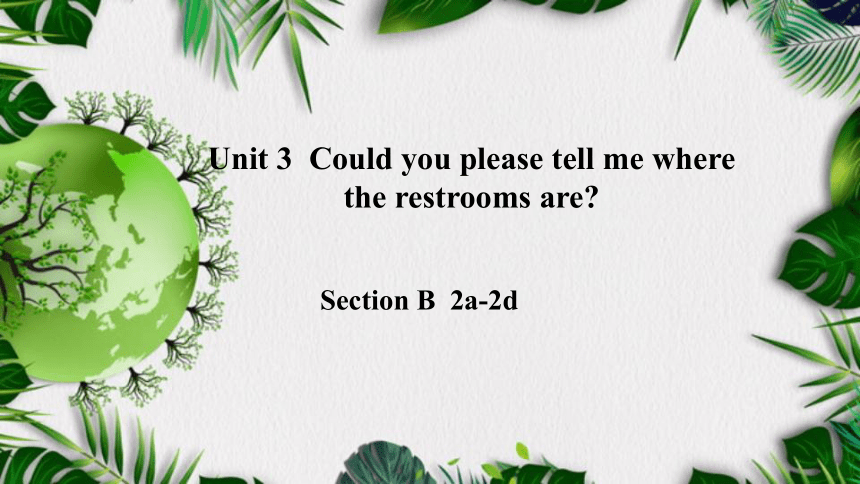 | |
| 格式 | pptx | ||
| 文件大小 | 1.9MB | ||
| 资源类型 | 教案 | ||
| 版本资源 | 人教新目标(Go for it)版 | ||
| 科目 | 英语 | ||
| 更新时间 | 2023-10-12 13:58:24 | ||
图片预览

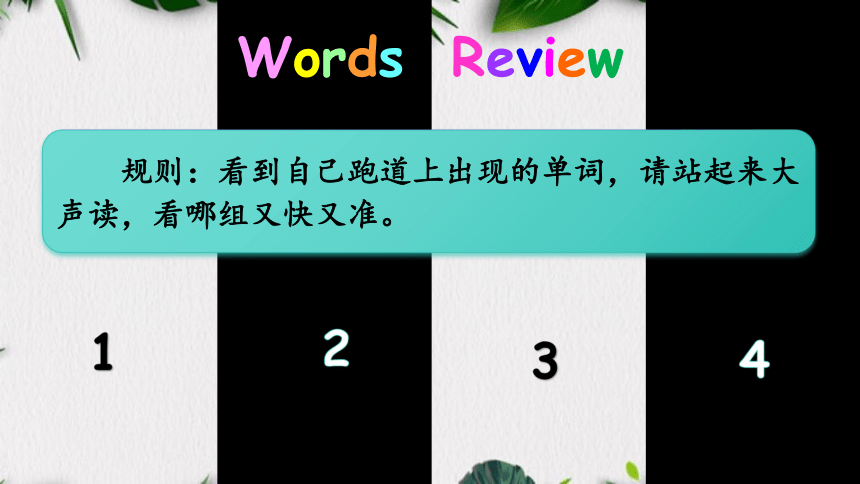
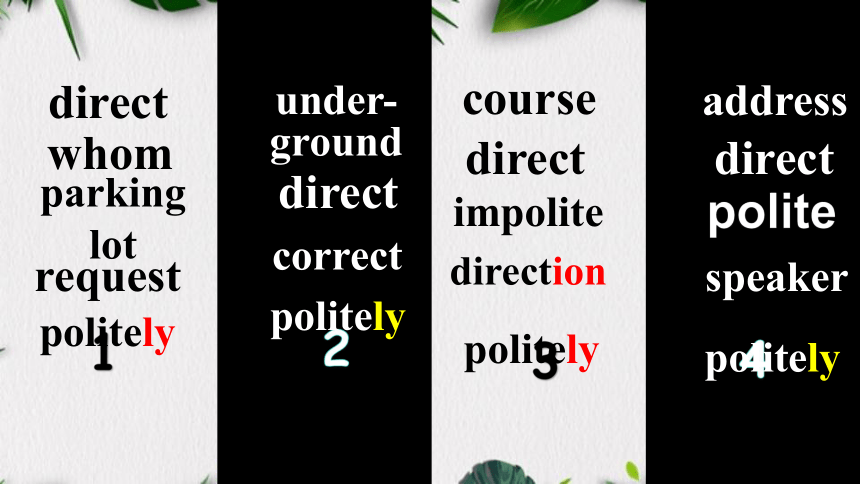

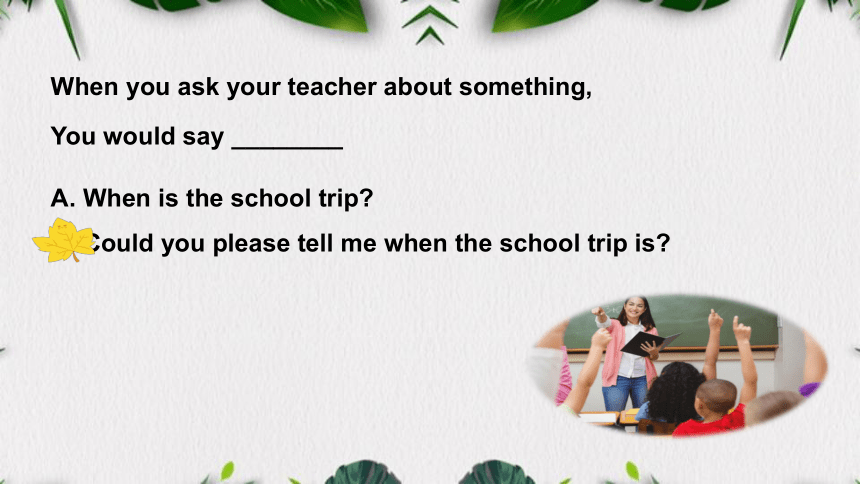
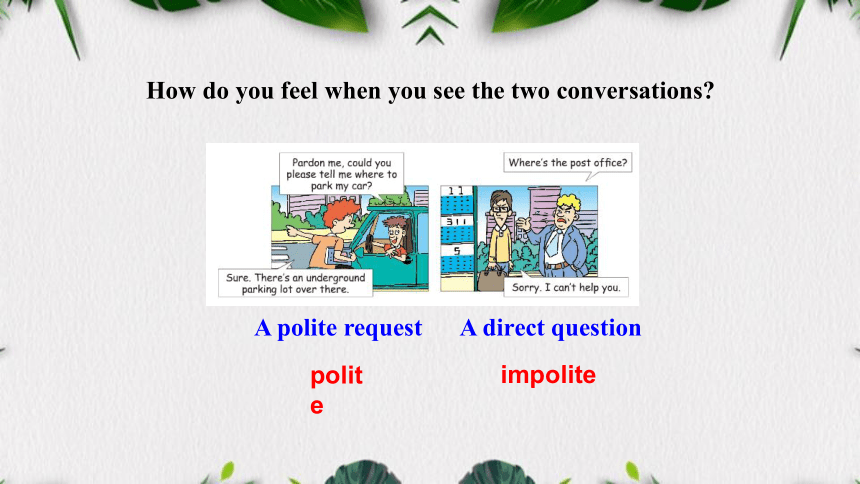
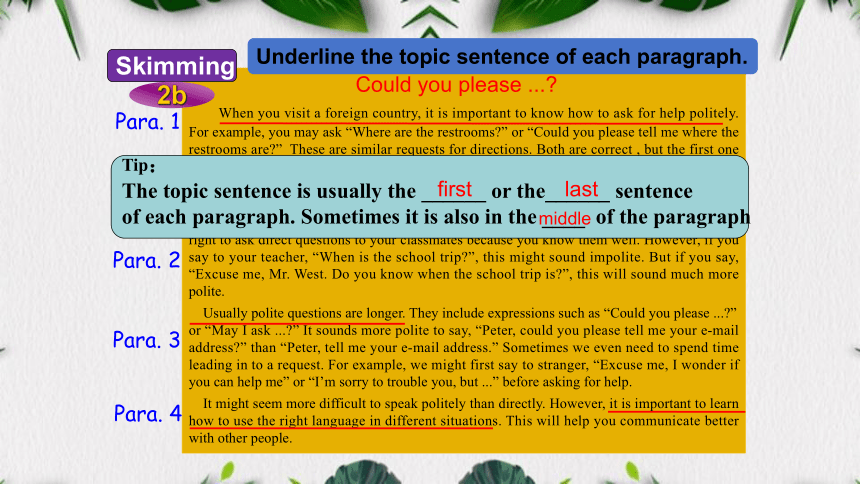
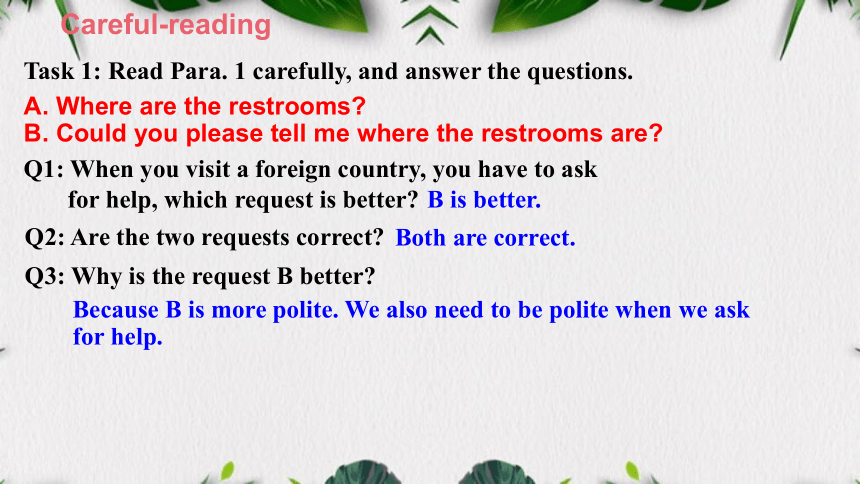

文档简介
(共24张PPT)
Section B 2a-2d
Unit 3 Could you please tell me where the restrooms are
1
2
4
3
Words Review
规则:看到自己跑道上出现的单词,请站起来大声读,看哪组又快又准。
1
2
4
3
politely
politely
politely
politely
direction
correct
polite
direct
direct
direct
direct
speaker
whom
impolite
address
under-ground
parking lot
course
request
Let’s choose
When you ask a stranger for information,
A. Where is the restroom
B. Could you tell me where
the restroom is
You would say ________
When you ask your teacher about something,
A. When is the school trip
B. Could you please tell me when the school trip is
You would say ________
How do you feel when you see the two conversations
A polite request
A direct question
polite
impolite
Could you please ...
When you visit a foreign country, it is important to know how to ask for help politely. For example, you may ask “Where are the restrooms ” or “Could you please tell me where the restrooms are ” These are similar requests for directions. Both are correct , but the first one sounds less polite. That is because it is a very direct question. It is not enough to just ask a question correctly. We also need to learn how to be polite when we ask for help.
Good speakers change the way they speak in different situations. The expressions they use might depend on whom they are speaking to or how well they know each other well. It is all right to ask direct questions to your classmates because you know them well. However, if you say to your teacher, “When is the school trip ”, this might sound impolite. But if you say, “Excuse me, Mr. West. Do you know when the school trip is ”, this will sound much more polite.
Usually polite questions are longer. They include expressions such as “Could you please ... ” or “May I ask ... ” It sounds more polite to say, “Peter, could you please tell me your e-mail address ” than “Peter, tell me your e-mail address.” Sometimes we even need to spend time leading in to a request. For example, we might first say to stranger, “Excuse me, I wonder if you can help me” or “I’m sorry to trouble you, but ...” before asking for help.
It might seem more difficult to speak politely than directly. However, it is important to learn how to use the right language in different situations. This will help you communicate better with other people.
Skimming
Underline the topic sentence of each paragraph.
Tip:
The topic sentence is usually the ______ or the______ sentence
of each paragraph. Sometimes it is also in the ____ of the paragraph
first
last
middle
Para. 1
Para. 2
Para. 3
Para. 4
2b
Task 1: Read Para. 1 carefully, and answer the questions.
A. Where are the restrooms
B. Could you please tell me where the restrooms are
Q1: When you visit a foreign country, you have to ask
for help, which request is better
Q2: Are the two requests correct
Q3: Why is the request B better
B is better.
Both are correct.
Because B is more polite. We also need to be polite when we ask for help.
Careful-reading
Could You Please…
When you visit a foreign country, it is important to know how to ask for help politely. For example, you may ask “Where are the restrooms ” or “Could you please tell me where the restrooms are ” These are similar requests for directions. Both are correct, but the first one sounds less polite. That is because it is a very direct question.
Could you please tell me where the restrooms are
That is because it is a very __________ question.
direct questions
polite questions
Where are the restrooms
direct
make requests
Could You Please…
When you visit a foreign country, it is important to know how to ask for help politely. For example, you may ask “Where are the restrooms ” or “Could you please tell me where the restrooms are ” These are similar requests for directions. Both are correct, but the first one sounds less polite. That is because it is a very direct question.
那是因为……其中because引导的句子作表语,是表语从句,用来说明原因。
Read Para2 and fill in the table
Requests To whom
When is the school trip
Excuse me, Mr West. Do you know when the school trip is
classmates
teacher
Conversation2:
Student: When is the school trip
Teacher: ________________.
Conversation1:
Student: Excuse me, Mr West. Do you know when the school trip is
Teacher: _______________.
Good speakers change the way they speak in different situations.The expressions good speakers use might depend on _______________________________or _____________________________
whom they are speaking to
how well they know each other
Read Para2 again and fill in the blank
When is the school trip
Excuse me, Mr West. Do you know when the school trip is
classmates
teacher
Requests
To whom
When is the school trip
make requests
polite questions
direct questions
Could you please tell me...
Where are the restrooms
examples
examples
to whom
to whom
classmates
teachers
/old people
/strangers...
/ friends...
Excuse me, Mr West. Do you know when the school trip is
people you know very well
Good speakers change the way they speak in different situations.The expressions good speakers use might depend on _______________________________or _____________________________
whom they are speaking to
how well they know each other
It is not enough to just ask a question correctly. We also need to learn how to be polite when we ask for help.
Good speakers change the way they speak in different situations. The expressions they use might depend on whom they are speaking to or how well they know each other. It is all right to ask your classmates direct questions because you know them well. However, if you say to your teacher, “When is the school trip ”, this might sound impolite.
depend on 取决于,依靠……
depend on +n./doing/that
Read Para. 3 carefully, and answer the questions.
Usually
polite questions
are
longer.
Could you please...
May I ask...
Excuse me. I wonder if you can help.
I’m sorry to trouble you, but ...
Longer questions can be more ______ and we need to spend time ___________________ before asking for help.
polite
leading into a request
But if you say, “Excuse me, Mr. West. Do you know when the school trip is ”, this will sound much more polite.
Usually polite questions are longer. They include expressions such as “Could you please… ” or “May I ask… ” It sounds more polite to say, “Peter, could you please tell me your e-mail address ” than “Peter, tell me your e-mail address.”
include v. 包括;包含
including prep. 包括……在内
后接n./doing/pron.
Could you please tell me…
direct questions
polite questions
Where are …
make requests
When is …
teachers
You know them well.
/old people
/strangers
Excuse me, Mr West. Do you know…
to whom
to whom
examples
examples
features
Could you please ...
May I ask...?
Excuse me, I wonder if you can
help me...
I’m sorry to trouble you, but...
longer
Mind map
It’s very impolite to learn how to use the _____language in _______ situations.
right
different
Read para4 and fill in the blanks
Sometimes we even need to spend time leading into a request. For example, we might first say to a stranger, “Excuse me, I wonder if you can help me” or “I’m sorry to trouble you, but…” before asking for help.
It might seem more difficult to speak politely than directly. However, it is important to learn how to use the right language in different situations. This will help you communicate better with other people.
sb. spend(s) time/money (in) doing sth. 某人花费时间/金钱做 sb. spend(s) time/money on sth. 某人花费时间/金钱在某事/某物上
It takes sb. some time to do sth. 做某事花费某人一些时间
sth. cost(s) sb. some money 某物花费某人一些钱
sb. pay(s) some money for sth. 某人为某物花了一些钱
trouble v. 打扰;麻烦 trouble sb. to do sth. 麻烦某人做某事 trouble sb. with sth. 因某事而麻烦某人
trouble n. 问题;苦恼 (be) in trouble 处于困境中get into trouble 陷入困境 have trouble in doing sth./with sth. 做某事有困难
Task 5: Translate the phrases into Chinese.
要求
例如
在不同的情况下
依靠;信赖
互相
引入;导入
与……交流
停车场;停车区
ask for
such as/for example
in different situations
depend on
each other
lead into
communicate with…
parking lot
2c
Find the direct questions and polite requests from the passage.
Direct questions Polite requests
1. 1.
2. 2.
3. 3.
4.
Where are the restrooms
When is the school trip
Where’s the post office
Could you please tell me where the restrooms are
Excuse me, Mr. West. Do you know when the school trip is
Peter, could you please tell me your e-mail address
Pardon me, could you please tell me where to park my car
2d
Read the requests below. In the second column, write A if you would say it to someone you know and B if you would say it to a stranger. In the last column, write where you think the people are talking.
Request Person Place
1.Will you pass the salt
2. Do you know where I can change some money, please
3. Could you tell me what just happened
4. Can you please tell me where the nearest station is
5. Excuse me, do you know what time it begins, please
6.Let me know when you’re ready, OK
7.Could you possibly tell me the way to the village school
A
restaurant/home
B
street
any public place/home
A/B
B
street
B
movie theatre/center hall
A
home
B
street
Try to retell
Para. 1: ask for
help politely
Para. 2: change the way in different situations
Para. 3: usually polite questions are longer
Para. 4: how to use the right language
Where are…
Could you please…
less polite, direct
be polite
Both are right.
depend on
whom they are speaking to
how well they know each other
expressions
spend time leading into a request
Could you please…
/May I ask…
Excuse me, I wonder
if…/ I’m sorry …
speak politely
help you communicate better with other people
more difficult
more polite
完成句子。
1.知道如何礼貌地请求帮助很重要。
It's important how to
for help .
2. 有时候我们甚至花时间引出一个请求。
Sometimes we even need
time to a request.
to know
ask for
politely
to spend
leading in
3. 好的说话者会在不同的情境下改变他们的说话方式。
Good speakers change the way they speak _____
situations.
4. 你能告诉我去村里学校的路吗?
Could you tell me ____ ____ ____ the village school 2·
the way to
in
different
Section B 2a-2d
Unit 3 Could you please tell me where the restrooms are
1
2
4
3
Words Review
规则:看到自己跑道上出现的单词,请站起来大声读,看哪组又快又准。
1
2
4
3
politely
politely
politely
politely
direction
correct
polite
direct
direct
direct
direct
speaker
whom
impolite
address
under-ground
parking lot
course
request
Let’s choose
When you ask a stranger for information,
A. Where is the restroom
B. Could you tell me where
the restroom is
You would say ________
When you ask your teacher about something,
A. When is the school trip
B. Could you please tell me when the school trip is
You would say ________
How do you feel when you see the two conversations
A polite request
A direct question
polite
impolite
Could you please ...
When you visit a foreign country, it is important to know how to ask for help politely. For example, you may ask “Where are the restrooms ” or “Could you please tell me where the restrooms are ” These are similar requests for directions. Both are correct , but the first one sounds less polite. That is because it is a very direct question. It is not enough to just ask a question correctly. We also need to learn how to be polite when we ask for help.
Good speakers change the way they speak in different situations. The expressions they use might depend on whom they are speaking to or how well they know each other well. It is all right to ask direct questions to your classmates because you know them well. However, if you say to your teacher, “When is the school trip ”, this might sound impolite. But if you say, “Excuse me, Mr. West. Do you know when the school trip is ”, this will sound much more polite.
Usually polite questions are longer. They include expressions such as “Could you please ... ” or “May I ask ... ” It sounds more polite to say, “Peter, could you please tell me your e-mail address ” than “Peter, tell me your e-mail address.” Sometimes we even need to spend time leading in to a request. For example, we might first say to stranger, “Excuse me, I wonder if you can help me” or “I’m sorry to trouble you, but ...” before asking for help.
It might seem more difficult to speak politely than directly. However, it is important to learn how to use the right language in different situations. This will help you communicate better with other people.
Skimming
Underline the topic sentence of each paragraph.
Tip:
The topic sentence is usually the ______ or the______ sentence
of each paragraph. Sometimes it is also in the ____ of the paragraph
first
last
middle
Para. 1
Para. 2
Para. 3
Para. 4
2b
Task 1: Read Para. 1 carefully, and answer the questions.
A. Where are the restrooms
B. Could you please tell me where the restrooms are
Q1: When you visit a foreign country, you have to ask
for help, which request is better
Q2: Are the two requests correct
Q3: Why is the request B better
B is better.
Both are correct.
Because B is more polite. We also need to be polite when we ask for help.
Careful-reading
Could You Please…
When you visit a foreign country, it is important to know how to ask for help politely. For example, you may ask “Where are the restrooms ” or “Could you please tell me where the restrooms are ” These are similar requests for directions. Both are correct, but the first one sounds less polite. That is because it is a very direct question.
Could you please tell me where the restrooms are
That is because it is a very __________ question.
direct questions
polite questions
Where are the restrooms
direct
make requests
Could You Please…
When you visit a foreign country, it is important to know how to ask for help politely. For example, you may ask “Where are the restrooms ” or “Could you please tell me where the restrooms are ” These are similar requests for directions. Both are correct, but the first one sounds less polite. That is because it is a very direct question.
那是因为……其中because引导的句子作表语,是表语从句,用来说明原因。
Read Para2 and fill in the table
Requests To whom
When is the school trip
Excuse me, Mr West. Do you know when the school trip is
classmates
teacher
Conversation2:
Student: When is the school trip
Teacher: ________________.
Conversation1:
Student: Excuse me, Mr West. Do you know when the school trip is
Teacher: _______________.
Good speakers change the way they speak in different situations.The expressions good speakers use might depend on _______________________________or _____________________________
whom they are speaking to
how well they know each other
Read Para2 again and fill in the blank
When is the school trip
Excuse me, Mr West. Do you know when the school trip is
classmates
teacher
Requests
To whom
When is the school trip
make requests
polite questions
direct questions
Could you please tell me...
Where are the restrooms
examples
examples
to whom
to whom
classmates
teachers
/old people
/strangers...
/ friends...
Excuse me, Mr West. Do you know when the school trip is
people you know very well
Good speakers change the way they speak in different situations.The expressions good speakers use might depend on _______________________________or _____________________________
whom they are speaking to
how well they know each other
It is not enough to just ask a question correctly. We also need to learn how to be polite when we ask for help.
Good speakers change the way they speak in different situations. The expressions they use might depend on whom they are speaking to or how well they know each other. It is all right to ask your classmates direct questions because you know them well. However, if you say to your teacher, “When is the school trip ”, this might sound impolite.
depend on 取决于,依靠……
depend on +n./doing/that
Read Para. 3 carefully, and answer the questions.
Usually
polite questions
are
longer.
Could you please...
May I ask...
Excuse me. I wonder if you can help.
I’m sorry to trouble you, but ...
Longer questions can be more ______ and we need to spend time ___________________ before asking for help.
polite
leading into a request
But if you say, “Excuse me, Mr. West. Do you know when the school trip is ”, this will sound much more polite.
Usually polite questions are longer. They include expressions such as “Could you please… ” or “May I ask… ” It sounds more polite to say, “Peter, could you please tell me your e-mail address ” than “Peter, tell me your e-mail address.”
include v. 包括;包含
including prep. 包括……在内
后接n./doing/pron.
Could you please tell me…
direct questions
polite questions
Where are …
make requests
When is …
teachers
You know them well.
/old people
/strangers
Excuse me, Mr West. Do you know…
to whom
to whom
examples
examples
features
Could you please ...
May I ask...?
Excuse me, I wonder if you can
help me...
I’m sorry to trouble you, but...
longer
Mind map
It’s very impolite to learn how to use the _____language in _______ situations.
right
different
Read para4 and fill in the blanks
Sometimes we even need to spend time leading into a request. For example, we might first say to a stranger, “Excuse me, I wonder if you can help me” or “I’m sorry to trouble you, but…” before asking for help.
It might seem more difficult to speak politely than directly. However, it is important to learn how to use the right language in different situations. This will help you communicate better with other people.
sb. spend(s) time/money (in) doing sth. 某人花费时间/金钱做 sb. spend(s) time/money on sth. 某人花费时间/金钱在某事/某物上
It takes sb. some time to do sth. 做某事花费某人一些时间
sth. cost(s) sb. some money 某物花费某人一些钱
sb. pay(s) some money for sth. 某人为某物花了一些钱
trouble v. 打扰;麻烦 trouble sb. to do sth. 麻烦某人做某事 trouble sb. with sth. 因某事而麻烦某人
trouble n. 问题;苦恼 (be) in trouble 处于困境中get into trouble 陷入困境 have trouble in doing sth./with sth. 做某事有困难
Task 5: Translate the phrases into Chinese.
要求
例如
在不同的情况下
依靠;信赖
互相
引入;导入
与……交流
停车场;停车区
ask for
such as/for example
in different situations
depend on
each other
lead into
communicate with…
parking lot
2c
Find the direct questions and polite requests from the passage.
Direct questions Polite requests
1. 1.
2. 2.
3. 3.
4.
Where are the restrooms
When is the school trip
Where’s the post office
Could you please tell me where the restrooms are
Excuse me, Mr. West. Do you know when the school trip is
Peter, could you please tell me your e-mail address
Pardon me, could you please tell me where to park my car
2d
Read the requests below. In the second column, write A if you would say it to someone you know and B if you would say it to a stranger. In the last column, write where you think the people are talking.
Request Person Place
1.Will you pass the salt
2. Do you know where I can change some money, please
3. Could you tell me what just happened
4. Can you please tell me where the nearest station is
5. Excuse me, do you know what time it begins, please
6.Let me know when you’re ready, OK
7.Could you possibly tell me the way to the village school
A
restaurant/home
B
street
any public place/home
A/B
B
street
B
movie theatre/center hall
A
home
B
street
Try to retell
Para. 1: ask for
help politely
Para. 2: change the way in different situations
Para. 3: usually polite questions are longer
Para. 4: how to use the right language
Where are…
Could you please…
less polite, direct
be polite
Both are right.
depend on
whom they are speaking to
how well they know each other
expressions
spend time leading into a request
Could you please…
/May I ask…
Excuse me, I wonder
if…/ I’m sorry …
speak politely
help you communicate better with other people
more difficult
more polite
完成句子。
1.知道如何礼貌地请求帮助很重要。
It's important how to
for help .
2. 有时候我们甚至花时间引出一个请求。
Sometimes we even need
time to a request.
to know
ask for
politely
to spend
leading in
3. 好的说话者会在不同的情境下改变他们的说话方式。
Good speakers change the way they speak _____
situations.
4. 你能告诉我去村里学校的路吗?
Could you tell me ____ ____ ____ the village school 2·
the way to
in
different
同课章节目录
- Unit 1 How can we become good learners.
- Section A
- Section B
- Unit 2 I think that mooncakes are delicious!
- Section A
- Section B
- Unit 3 Could you please tell me where the restroom
- Section A
- Section B
- Unit 4 I used to be afraid of the dark.
- Section A
- Section B
- Unit 5 What are the shirts made of?
- Section A
- Section B
- Review of Units 1-5
- Unit 6 When was it invented?
- Section A
- Section B
- Unit 7 Teenagers should be allowed to choose their
- Section A
- Section B
- Unit 8 It must belong to Carla.
- Section A
- Section B
- Unit 9 I like music that I can dance to.
- Section A
- Section B
- Unit 10 You're supposed to shake hands.
- Section A
- Section B
- Review of Units 6-10
- Unit 11 Sad movies make me cry.
- Section A
- Section B
- Unit 12 Life is full of the unexpected
- Section A
- Section B
- Unit 13 We're trying to save the earth!
- Section A
- Section B
- Unit 14 I remember meeting all of you in Grade 7.
- Section A
- Section B
- Review of Units 11-14
